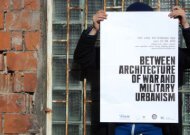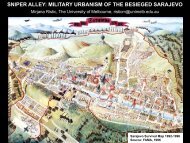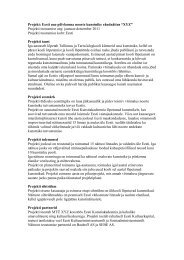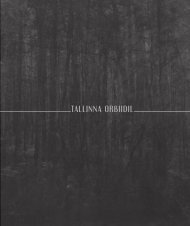- Page 1 and 2:
Kadri Kallaste PRESERVATION OF WALL
- Page 3 and 4:
2
- Page 5 and 6:
Kadri Kallaste Preservation of Wall
- Page 7 and 8:
3. Discussing principles of conserv
- Page 9 and 10:
I am thankful to all the people and
- Page 11 and 12:
10
- Page 13 and 14:
12
- Page 15 and 16:
14
- Page 17 and 18:
Introduction removed from its origi
- Page 19 and 20:
Introduction Kristel Kevvai (2008)
- Page 21 and 22:
Introduction CHOICE OF TOPIC The ch
- Page 23 and 24:
Introduction OBJECTS OF RESEARCH Ei
- Page 25 and 26:
Introduction STRUCTURE OF THE THESI
- Page 27 and 28:
Introduction HISTORIOGRAPHY AND SOU
- Page 29 and 30:
Introduction The material dealing w
- Page 31 and 32:
30
- Page 33 and 34:
32
- Page 35 and 36:
Historic types of wallpaper and dec
- Page 37 and 38:
Historic types of wallpaper and dec
- Page 39 and 40:
Historic types of wallpaper and dec
- Page 41 and 42:
Historic types of wallpaper and dec
- Page 43 and 44:
Historic types of wallpaper and dec
- Page 45 and 46:
Historic types of wallpaper and dec
- Page 47 and 48:
Historic types of wallpaper and dec
- Page 49 and 50:
Historic types of wallpaper and dec
- Page 51 and 52:
Historic types of wallpaper and dec
- Page 53 and 54:
Historic types of wallpaper and dec
- Page 55 and 56:
Historic types of wallpaper and dec
- Page 57 and 58:
Historic types of wallpaper and dec
- Page 59 and 60:
Historic types of wallpaper and dec
- Page 61 and 62:
Historic types of wallpaper and dec
- Page 63 and 64:
Historic types of wallpaper and dec
- Page 65 and 66:
Historic types of wallpaper and dec
- Page 67 and 68:
Historic types of wallpaper and dec
- Page 69 and 70:
Historic types of wallpaper and dec
- Page 71 and 72:
Historic types of wallpaper and dec
- Page 73 and 74:
Historic types of wallpaper and dec
- Page 75 and 76:
Historic types of wallpaper and dec
- Page 77 and 78:
Historic types of wallpaper and dec
- Page 79 and 80:
Historic types of wallpaper and dec
- Page 81 and 82:
Historic types of wallpaper and dec
- Page 83 and 84:
Historic types of wallpaper and dec
- Page 85 and 86:
Historic types of wallpaper and dec
- Page 87 and 88:
Historic types of wallpaper and dec
- Page 89 and 90:
Historic types of wallpaper and dec
- Page 91 and 92:
Historic types of wallpaper and dec
- Page 93 and 94:
Historic types of wallpaper and dec
- Page 95 and 96: Historic types of wallpaper and dec
- Page 97 and 98: Historic types of wallpaper and dec
- Page 99 and 100: Historic types of wallpaper and dec
- Page 101 and 102: Historic types of wallpaper and dec
- Page 103 and 104: Historic types of wallpaper and dec
- Page 105 and 106: Historic types of wallpaper and dec
- Page 107 and 108: 106
- Page 109 and 110: 108
- Page 111 and 112: Methods of wallpaper production and
- Page 113 and 114: Methods of wallpaper production and
- Page 115 and 116: Methods of wallpaper production and
- Page 117 and 118: Methods of wallpaper production and
- Page 119 and 120: Methods of wallpaper production and
- Page 121 and 122: Methods of wallpaper production and
- Page 123 and 124: Methods of wallpaper production and
- Page 125 and 126: Methods of wallpaper production and
- Page 127 and 128: Methods of wallpaper production and
- Page 129 and 130: Methods of wallpaper production and
- Page 131 and 132: Methods of wallpaper production and
- Page 133 and 134: Methods of wallpaper production and
- Page 135 and 136: Methods of wallpaper production and
- Page 137 and 138: Methods of wallpaper production and
- Page 139 and 140: 138
- Page 141 and 142: Discussing principles of conservati
- Page 143 and 144: Discussing principles of conservati
- Page 145: Discussing principles of conservati
- Page 149 and 150: Discussing principles of conservati
- Page 151 and 152: Discussing principles of conservati
- Page 153 and 154: Discussing principles of conservati
- Page 155 and 156: Discussing principles of conservati
- Page 157 and 158: Discussing principles of conservati
- Page 159 and 160: Discussing principles of conservati
- Page 161 and 162: Discussing principles of conservati
- Page 163 and 164: 162
- Page 165 and 166: Preservation of wallpaper as a part
- Page 167 and 168: Preservation of wallpaper as a part
- Page 169 and 170: Preservation of wallpaper as a part
- Page 171 and 172: Preservation of wallpaper as a part
- Page 173 and 174: Preservation of wallpaper as a part
- Page 175 and 176: Preservation of wallpaper as a part
- Page 177 and 178: Preservation of wallpaper as a part
- Page 179 and 180: Preservation of wallpaper as a part
- Page 181 and 182: Preservation of wallpaper as a part
- Page 183 and 184: Preservation of wallpaper as a part
- Page 185 and 186: Preservation of wallpaper as a part
- Page 187 and 188: Preservation of wallpaper as a part
- Page 189 and 190: Preservation of wallpaper as a part
- Page 191 and 192: Preservation of wallpaper as a part
- Page 193 and 194: Preservation of wallpaper as a part
- Page 195 and 196: Preservation of wallpaper as a part
- Page 197 and 198:
Preservation of wallpaper as a part
- Page 199 and 200:
Preservation of wallpaper as a part
- Page 201 and 202:
Preservation of wallpaper as a part
- Page 203 and 204:
Preservation of wallpaper as a part
- Page 205 and 206:
Preservation of wallpaper as a part
- Page 207 and 208:
Preservation of wallpaper as a part
- Page 209 and 210:
Preservation of wallpaper as a part
- Page 211 and 212:
Preservation of wallpaper as a part
- Page 213 and 214:
Preservation of wallpaper as a part
- Page 215 and 216:
Preservation of wallpaper as a part
- Page 217 and 218:
Preservation of wallpaper as a part
- Page 219 and 220:
218
- Page 221 and 222:
Task of conservation. Case studies
- Page 223 and 224:
Task of conservation. Case studies
- Page 225 and 226:
Task of conservation. Case studies
- Page 227 and 228:
Task of conservation. Case studies
- Page 229 and 230:
Task of conservation. Case studies
- Page 231 and 232:
Task of conservation. Case studies
- Page 233 and 234:
Task of conservation. Case studies
- Page 235 and 236:
Task of conservation. Case studies
- Page 237 and 238:
Task of conservation. Case studies
- Page 239 and 240:
Task of conservation. Case studies
- Page 241 and 242:
Task of conservation. Case studies
- Page 243 and 244:
Task of conservation. Case studies
- Page 245 and 246:
Task of conservation. Case studies
- Page 247 and 248:
Task of conservation. Case studies
- Page 249 and 250:
Task of conservation. Case studies
- Page 251 and 252:
Task of conservation. Case studies
- Page 253 and 254:
Task of conservation. Case studies
- Page 255 and 256:
Task of conservation. Case studies
- Page 257 and 258:
Task of conservation. Case studies
- Page 259 and 260:
Task of conservation. Case studies
- Page 261 and 262:
Task of conservation. Case studies
- Page 263 and 264:
Task of conservation. Case studies
- Page 265 and 266:
Task of conservation. Case studies
- Page 267 and 268:
Task of conservation. Case studies
- Page 269 and 270:
Task of conservation. Case studies
- Page 271 and 272:
Task of conservation. Case studies
- Page 273 and 274:
Task of conservation. Case studies
- Page 275 and 276:
Task of conservation. Case studies
- Page 277 and 278:
Task of conservation. Case studies
- Page 279 and 280:
Task of conservation. Case studies
- Page 281 and 282:
Task of conservation. Case studies
- Page 283 and 284:
Task of conservation. Case studies
- Page 285 and 286:
284
- Page 287 and 288:
Methodological conclusions preferre
- Page 289 and 290:
Methodological conclusions thetical
- Page 291 and 292:
consolidated and, secondly, if the
- Page 293 and 294:
Methodological conclusions the larg
- Page 295 and 296:
Methodological conclusions The auth
- Page 297 and 298:
Methodological conclusions briefly
- Page 299 and 300:
298
- Page 301 and 302:
300
- Page 303 and 304:
302
- Page 305 and 306:
Documentation of the work on the Pu
- Page 307 and 308:
Documentation of the work on the Pu
- Page 309 and 310:
Documentation of the work on the Pu
- Page 311 and 312:
Documentation of the work on the Pu
- Page 313 and 314:
Documentation of the work on the Pu
- Page 315 and 316:
Documentation of the work on the Pu
- Page 317 and 318:
Documentation of the work on the Pu
- Page 319 and 320:
Documentation of the work on the Pu
- Page 321 and 322:
Documentation of the work on the Pu
- Page 323 and 324:
Documentation of the work on the Pu
- Page 325 and 326:
Documentation of the work on the Pu
- Page 327 and 328:
Documentation of the work on the Pu
- Page 329 and 330:
Documentation of the work on the Pu
- Page 331 and 332:
Documentation of the work on the Pu
- Page 333 and 334:
Documentation of the work on the Pu
- Page 335 and 336:
334
- Page 337 and 338:
Documentation of the work on the Es
- Page 339 and 340:
Documentation of the work on the Es
- Page 341 and 342:
Documentation of the work on the Es
- Page 343 and 344:
Documentation of the work on the Es
- Page 345 and 346:
Documentation of the work on the Es
- Page 347 and 348:
Documentation of the work on the Es
- Page 349 and 350:
Documentation of the work on the Es
- Page 351 and 352:
Documentation of the work on the Es
- Page 353 and 354:
Documentation of the work on the Es
- Page 355 and 356:
354
- Page 357 and 358:
Kokkuvõte tapeetide säilitamine n
- Page 359 and 360:
Kokkuvõte Eestis ei ole aga muuseu
- Page 361 and 362:
Kokkuvõte lise väärtuse tõttu r
- Page 363 and 364:
Kokkuvõte rimislahenduse väljatö
- Page 365 and 366:
Kokkuvõte JÄRELDUSED Tapeetide re
- Page 367 and 368:
Kokkuvõte Tapeedi eemaldamine sell
- Page 369 and 370:
368
- Page 371 and 372:
370
- Page 373 and 374:
INTERVIEW Interview with Simona Pre
- Page 375 and 376:
Paccin - Preparation, Art Handling
- Page 377 and 378:
Collier, A., Wallpaper - In and Out
- Page 379 and 380:
Krista Kodres, Mart Kalm and Elo Lu
- Page 381 and 382:
Directory, 1997. Accessed September
- Page 383 and 384:
Stavenow-Hidemark, E., Textile desi
- Page 385 and 386:
384












